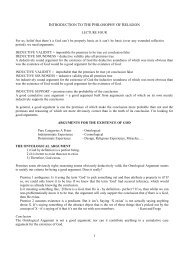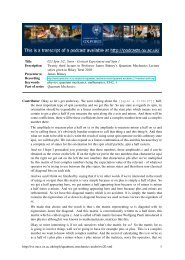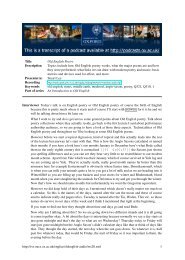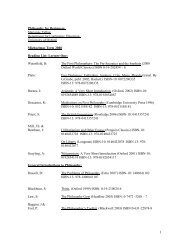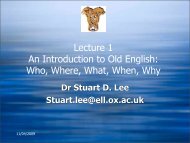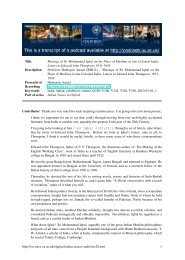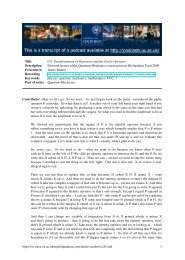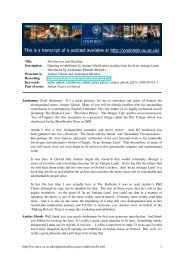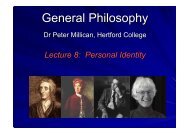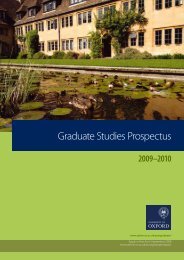Old English Prose - University of Oxford
Old English Prose - University of Oxford
Old English Prose - University of Oxford
Create successful ePaper yourself
Turn your PDF publications into a flip-book with our unique Google optimized e-Paper software.
<strong>Old</strong> <strong>English</strong> <strong>Prose</strong>But manuscripts cause us a problem. In a manuscript culture no copy is the same because someoneis copying from something else so it is prized as is the authority <strong>of</strong> the source <strong>of</strong> the text butcopying itself is not degraded as it is in the print culture where we prize originality. There is atextural fixity in print which there isn’t in the manuscript so let me give you an example <strong>of</strong> that.Supposing we have an author, he writes his little book or his little thing, the scribes they make acopies from that, then those copies are then copied by other scribes and <strong>of</strong>f these things go and ateach point the scribe can make errors. But more importantly at each point the scribe can say “Idon’t agree with that” and change it completely.So the idea that they could fit in or change text to suit their audience, their context etc. completelythrows the whole concept <strong>of</strong> authorship, they probably didn’t prize authorship as much as we dowhich is why Bath has said this about the death <strong>of</strong> the author. It emerges from the middle ages butit is not really there in the middle ages, well later middle ages it is.How was it, who were the audience and performance? Well I’ve tried to give a table here and Iwon’t go through it but these are a range <strong>of</strong> all the things you will come across in Anglo Saxonprose and if we just think <strong>of</strong> who they would have been interesting. Well obviously the richpeople, the noblemen, the administrators, the clergy would have been interested in key texts suchas homilies and sermons.The freemen, that is the people who aren’t slaves would have been interested in laws and chartersobviously. They might have been interested in oelic sermons they would have heard them and itwould have been a mixture. Sometimes you would have read a book in private, sometimes youwould have gone and heard this if you were a monk in a monastic <strong>of</strong>fice or at mass and sometimesat school because they did have a schooling system where they would educate people.It does develop so our early stuff, Anglo Saxon Chronicle 592 in this year there occurred a greatslaughter at Woburn’s barrier, barrow isn’t very complicated but towards the end Aflrich writing10th century the Holy Mother Mary fed that child and it grew just as other children do withoutany sins, it’s a much more complicated style <strong>of</strong> prose. And sometimes they don’t get it quite right;it’s a bit clumsy because you will come across what we call parataxis.I will give you some examples <strong>of</strong> that, the famous one is “I came, I saw, I conquered” but theAnglo Saxon would probably have said “I came and I saw and I conquered and then I did this andthen I did that and then I did this” and it kind <strong>of</strong> feels like a child writing for the first time. Butthey are learning.So example,” King Ethelred and his brother Alfred fought against the army at Merritown and theywere in two armies and there was a great slaughter on either side and their Bishop Hailman waskilled” and it trots on like that. The clause structure etc. they were learning it.They don’t get action very well, if you’ve done Cynwulf and Ceonhard in the Anglo SaxonChronicle it’s a bit complicated and Latin <strong>of</strong> course is a much more developed language for thesethings. So they struggle when they are translating from Latin to <strong>English</strong>.But they do do some good things. Rhetoric has become a buzz word now – hooray – thanks tothis man who has, as we will see is an advocate <strong>of</strong> rhetoric and obviously a student <strong>of</strong> rhetoric,mind you if they’d elected a beach ball compared with the previous guy we would all have beencelebrating.Rhetoric is the ability to convey a meaning and do it effectively to your audience, so we willpick not, this isn’t Obama, this is Martin Luther King and if you remember this famous speech“Let freedom ring from Stone Mountain <strong>of</strong> Georgia. Let freedom ring from Lookout Mountain<strong>of</strong> Tennessee. Let freedom ring..“ you can see what he’s doing, he is repeating here and whenthis happens, when we allow freedom to ring, when we let it ring, there is a lot <strong>of</strong> devices beingused here which we would class as rhetoric, rhetorical training and Obama did exactly this withhis inauguration speech. “When there was despair in the dustbowl and depression,” he’s used an8 http://rss.oucs.ox.ac.uk/engfac/oldenglish-audio/rss20.xml



